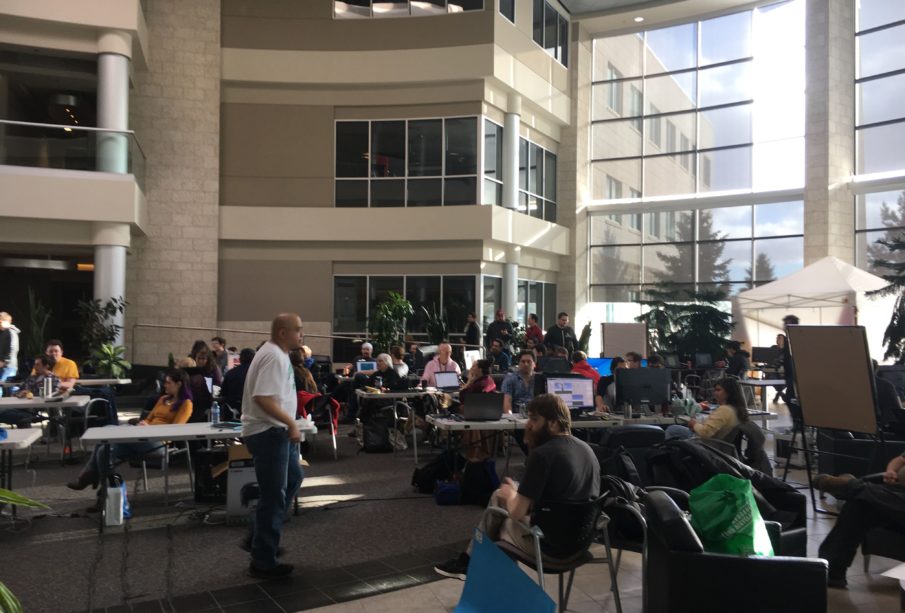Developers reach high score at Global Game Jam Regina

Gaming never looked so good
Many of us love to play games – video games, board games, or tabletop RPGs. Many of us also take for granted, though, that for any game to exist, a great amount of labour is needed for everything: creating a script, writing a code, creating sprites for every NPC, or designing the actual rules so that they make sense and don’t fall apart. For all of these jobs, we have game developers to thank, and for people who are really enthusiastic about games, the game industry can be an absolute dream job – or, if it’s really just a labour of love, a super time-consuming but equally fulfilling hobby.
Learning all the necessary skills to successfully develop your own games, though, can be a long and difficult road. “Game jams” are events that attempt to start people making games, events that also ease the discomfort when it comes to the development learning curve. In a game jam, people come together to create a game in a certain amount of limited time. At the end of the jam, no matter how many bugs the game has – whether people have a complete game or not – participants can know that they at the very least produced something and learned something about game development.
One of these jams, the annual Global Game Jam (GGJ) in Regina, took place at Innovation Place just off campus this week from Friday, Jan. 31 to Sunday, February 2. The GGJ takes place all over the world every year, with new countries joining all the time. “Think of it as a hackathon focused on game development,” the GGJ website explains. On Friday, the registered participants of the jam gather in their respective physical locations (Innovation Place, in Regina’s case), and watch a keynote presentation with advice from game developers. Then, they spend the next day and the morning after working on and finalizing their games, until they present demos for all participants on Sunday morning.
The GGJ’s website boasts that it is the largest game jam event in the world that takes place at physical locations, and there are a number of traits it has that keep it particularly interesting and easy to join. First, people of all experience levels are welcome at the GGJ; it’s okay if you’ve never designed a game before. Second, you can also design board games at the GGJ! Personally, I’ve recently been very interested in tabletop development and design, so this was the thing that caught my interest.
Third, every GGJ has a theme, announced on the Friday to get the developers thinking about what their game could be about. There are also a number of “diversifiers” if the brainstorming still isn’t kicking in – these are interesting gameplay quirks or fun twists that the games could be designed with, such as the “conlang” diversifier, where the game incorporates a fictional language, or the “feel your breath” diversifier, where gameplay makes the player physically out of breath.
The Carillon attended the GGJ Regina game demos on Sunday afternoon, where about 20 games were presented. This was a very impressive turnout, according to Kai Hutchence and Johannes Moersch, who were two of the organizers and lead developers at this year’s jam. The average number of games at a physical location is generally around 11, and Regina regularly has one of the largest sites for the game jam in Canada.
“Turnout was amazing this year,” Hutchence said in a final speech after the demos. “If we band together, we can do amazing things . .. the future is bright for game dev in Saskatchewan, thanks to all of you.” Hutchence also commended Regina in particular for the way it develops games in a small community: “Regina might not have a history with the [gaming] industry, but what we do have is that prairie spirit.”
Here are just a few of the cool, creative, and downright fun-sounding games that were presented as demos at Global Game Jam Regina 2020. The theme this year was repair.
Truly Ghostly: A game where you play as the ghost of someone who has died a tragic death, able to interact with objects and NPCs in the world without being seen. Your mission in the game is to repair your widowed wife’s relationships with her friends and future spouses. It uses pixel graphics, a comedic script, and is described by its small development team as an “Undertale-type” game. Made in the Unity engine.
Busted Beach: You move onto an island inhabited by villagers whose houses, and relationships, have all been destroyed, and have to repair them all. There are plenty of side quests, and as you complete them, the music of the game gets more complex. You can also create your beach village’s theme song at the beginning of the game; this gave me an Animal Crossing vibe. Also some funny dialogue. Includes a starfish character named Chad.
Scandal: A board game where players are space politicians, trying to “repair” their broken reputations. You receive a random scandal on a card – a deep, dark secret that can be revealed or overcome – and have five rounds to gather support and votes before the big election. Includes “voting blocks” that the politicians can appeal to with made-up space demographics, and the abilities to fundraise, take a bribe, do some opposition research, or even engage in gerrymandering.
Geoff’s Workshop: This was actually a fully functional escape room that one developing team set up in a tent inside Innovation Place. In it, you try to find an old toyshop owner’s lost marble that will activate a Rube Goldberg machine inside. Finding the marble requires that you solve some puzzles, having to do with the toys inside his toyshop.
Co-op Copters: A game made in solidarity with the Unifor workers who have been locked out of the Co-op refinery since Dec. 5. You control the helicopter Co-op uses to helicopter its scab workers to the refinery, and the more scabs you take to work, the more inefficiently the refinery is run. Essentially, if you’re good at the game, the flares inside the refinery will become so dangerous they cause the apocalypse. If you don’t take any scabs in, the picketers outside the refinery will succeed in their negotiations, and you’ll lose the game – but the world won’t end. Games are art!
Segfault: A meta-game where you have to fix your broken game’s code from the inside by completing in-game quests. This one had some absolutely awesome music with original singing in a conlang! Whew!
If any of these games sound fun, and you’d like to see which other ones are out there, the Mackenzie Art Gallery will be holding a free “show-off night” on Thursday that wants to display these new games in an artistic context. John Carol from the Gallery says this is an effort to “bridge the gap between the art … and game scene,” two worlds that certainly can and should overlap.









